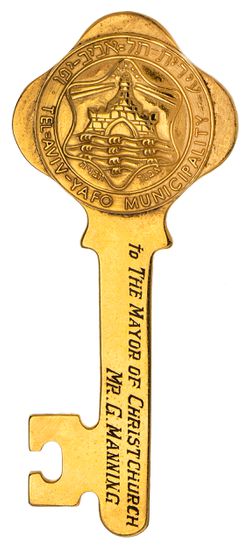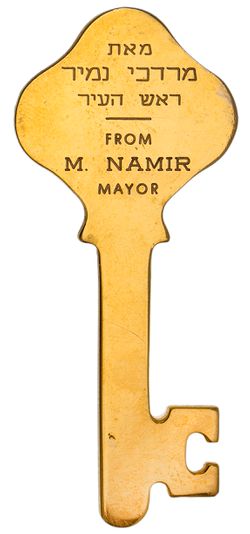Presentation Watches & Trophies
Lot 2699 Day 2 Presentation Watches & Trophies
Estimate $500
Bid at live.noble.com.au
ISRAEL, Tel Aviv-Yafo Municipality, c1960 presentation key, struck uniface in gilt base metal (80x35mm), obverse inscribed 'to The Mayor of Christchurch/Mr G.Manning', reverse inscribed 'From/M.Namir/Mayor' (also in Hebrew). Extremely fine, in a wooded fitted presentation case.
Manning, George (1887-1976)^Labourer, tram conductor, trade unionist, grocer, adult educationalist, local politician^^The following courtesy of Jean Sharfe, first published in the Dictionary of New Zealand Biography in 2000:^^George Manning was born at Gowerton, Glamorganshire, Wales, on 11 February 1887, the son of steelworker Richard Manning and his wife, Sarah Davies. At the age of 12 he won a scholarship to attend Gowerton School, but he left after 15 months to work at the local tinworks; two years later he moved to the Elba steelworks.^^From the beginning of his working life Manning took an active interest in the labour movement and at 17 he joined the Independent Labour Party. This commitment went hand-in-hand with a strong Christian faith. He was an active member of the Congregational church in Gowerton, and through his participation in study and discussion groups he developed an interest in economics. In 1910 he emigrated with a friend to Christchurch. He became a lay-preacher of the Congregational Union of New Zealand, and in 1911 considered taking a position as a minister at Mangawai, Northland. For a time he conducted burials in Christchurch using the rationalist service.^^After undertaking a variety of labouring jobs, Manning was employed by the Christchurch Tramway Board in 1911 as a tram conductor on the Sumner line. Two years later he moved to Wellington, where he spent two further years as a conductor. On his return to Christchurch in 1915 he worked as a grocer's assistant and in 1918 became assistant manager of the newly formed Canterbury Industrial Co-operative Society's store. On 11 October 1923 he married Scottish-born Sarah Edith Willmore at the Trinity Congregational Church, Christchurch; they were to have one son.^^During his early years in New Zealand Manning was an active union member. On his arrival in Christchurch he joined the general labourers' union, and he was later vice president of the Christchurch Tramway Employees' Union (1911-12) and the Canterbury Grocers' Assistants' Union (1916-18), representing the latter on the Canterbury Trades and Labour Council. In 1917 he became a member of the national executive of the United Federation of Labour. Later, during the depression, Manning wrote and published bulletins on behalf of the Trades and Labour Council and for six years contributed a weekly labour column to the Christchurch Star. From 1936 he supplemented his income by serving as secretary of the Christchurch Iron and Brass Moulders' Union.^^As his interest in economics and social policy developed, George Manning increasingly regretted his lack of formal education. When he left Wales he had resolved that should an `opportunity come my way in NZ to secure further Education I would jump at it'. That opportunity came in April 1915 when the Workers' Educational Association (WEA) commenced classes in Christchurch. He was an active member of the first tutorial class in economics, and each fortnight for four years submitted an essay to the tutor. These classes had a profound impact on Manning, and his ability impressed his tutors, particularly the young professor of economics at Canterbury College, J. B. Condliffe.^^In 1920 Manning returned to Wales on holiday. While there he received a telegram from Condliffe offering him the position of full-time organising secretary of the Canterbury WEA. The offer was on the condition that he abstain from politics (a restriction which was removed in 1925). Manning took up the position in February 1921, and was to serve until 1948. During this period he was the WEA's dominion secretary (1921-38) and president (1942-48), and also tutored in economics. Encouraged by Condliffe and James Hight to undertake part-time university studies, he gained a diploma in social science in 1927 and, in 1930, an MA in economics.^^George Manning's commitment and expertise in adult education received national recognition when he was appointed to the advisory committee set up in 1936 to design a comprehensive scheme for adult education in New Zealand. He was later appointed a WEA representative on the Council of Adult Education (1943) and its successor, the National Council of Adult Education (1948). From 1949 until 1958 he was on the staff of the adult education department of Canterbury University College as metropolitan tutor. In this position he delivered hundreds of lunchtime lectures to employees in Christchurch workplaces.^^With his strong belief in the right and duty of citizens to participate in a democracy it was not surprising that George Manning became involved in politics. After unsuccessful forays in 1917 and 1919 as a New Zealand Labour Party candidate for the Christchurch City Council, his WEA employment precluded further political activity until 1925. He served his first term as a councillor from 1927 to 1929, and victory in a 1936 by-election began 32 years of unbroken service. In 1958, after 7? years as deputy mayor, he was elected the city's mayor.^^Despite a lifelong affiliation with Labour, Manning came to be regarded as above party politics. The short, stocky Welshman had a large personal following, and it is said he never lost the common touch. Between 1944 and 1947 he was the only Labour member of the council and in 1959 was returned as mayor without a single Labour councillor. His personal popularity may also help explain how a Welsh-born nonconformist became a successful leader of New Zealand's most English and Anglican city.^^Manning was an advocate of Greater Christchurch, believing the amalgamation of smaller bodies with the city was necessary for the undertaking of larger projects. He had a vision of the city providing `a social and physical environment in which citizens may find expression for the whole human personality', regardless of their economic situation. In 1963 he made an official visit to the United Kingdom, where he was the guest of the lord mayor of London and visited Christchurch, Hampshire, where a street was named after him. In 1966 he led a delegation to Jamaica in a bid to secure the 1970 British Commonwealth Games for Christchurch. (This was unsuccessful, but the city was later selected to host the 1974 games.) He retired from the mayoralty in 1968.^^Manning had a long involvement with other local bodies. He was first elected to the Christchurch Tramway Board in 1933 and remained a member until 1951, when he failed to gain re-election while overseas. He was chairman of the board in 1937-38 and 1948-49 - the first former tram conductor to achieve the position. Elected to the Lyttelton Harbour Board in 1939, he served continuously from 1947 to 1971. From 1958 to 1968 he was a member of the Victory Park Board (which administered Lancaster Park) and the board of governors of the University of Canterbury. However, Manning failed to make the transition to national politics, unsuccessfully contesting parliamentary seats for Labour in 1943 (against S. G. Holland in Christchurch North) and 1949 (against J.T.Watts in St Albans).^^As an expatriate Welshman, Manning was an active member of the Cambrian Society of Canterbury for over 50 years, serving as its president and patron, and becoming a life member. During the 1930s he had been secretary of the local branch of the League of Nations Union of New Zealand. Both he and his wife Sarah were active in the Adult Cerebral Palsy Society; George was its founding patron and later a life member. He also had a lifelong interest in rugby.^^George Manning was appointed a CMG in 1960 for his service to local government and education, and in 1967 was further recognised with a knighthood. In 1972 the University of Canterbury awarded him an honorary LLD. He died in Christchurch on 29 December 1976, survived by his wife and son; Sarah Manning died in 1998.
Estimate / sale price does not include buyer's premium (currently 22% including GST) which is added to hammer price. All bids are executed on the understanding that the Terms & Conditions of sale have been read and accepted. For information on grading and estimates please refer to the Buying at Auction advice.
Quick find
View a lot by number and sale.
Adjacent lots
Lot 2697
MASONIC, presentation trowel, in sterling silver with faux ivory handle (tot length 22cm, width 5.7cm), ...
Estimate $1,250
Lot 2698
NAPKIN RINGS, plain, in sterling silver (60x30x27mm), inscribed 'From Staff/Terminus Hotel/19.9.49'. Very fine. (2)
Estimate $100
Lot 2699 This lot
ISRAEL, Tel Aviv-Yafo Municipality, c1960 presentation key, struck uniface in gilt base metal (80x35mm), obverse ...
Estimate $500
Lot 2700
ROYAL NEW ZEALAND YACHT SQUADRON, 1871-1971, centenary plaque in nickel steel and enamel (81x92mm), hollow ...
Estimate $300
Lot 2701
CHRISTIE, 1881-1981, 100 Years Service & Satisfaction, paper weight or desk stand in cast iron ...
Estimate $250

